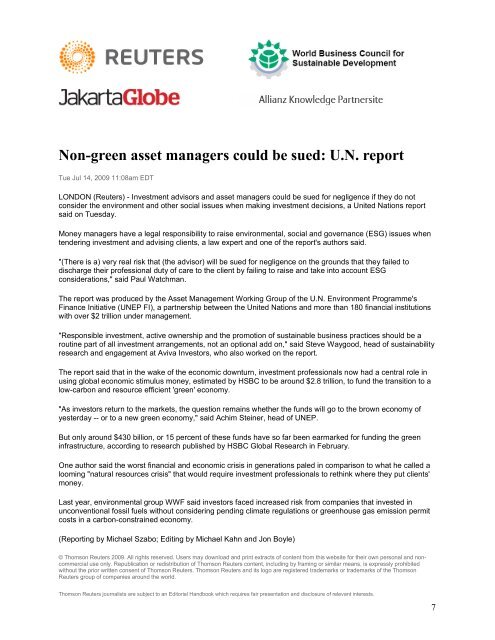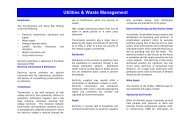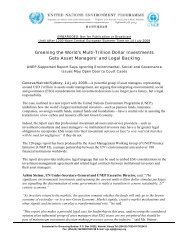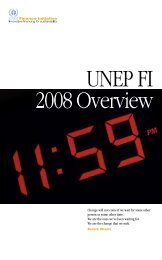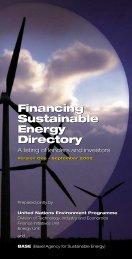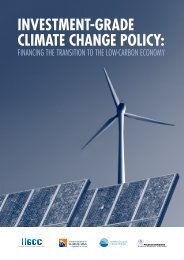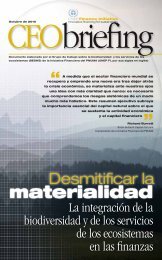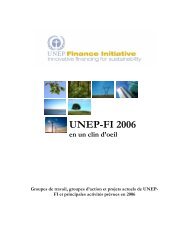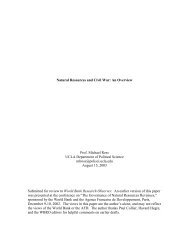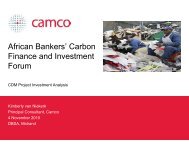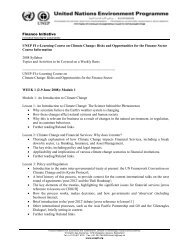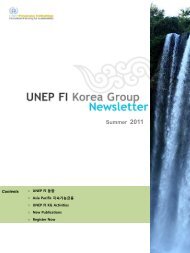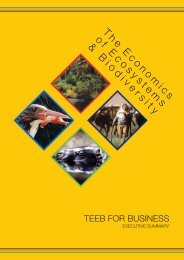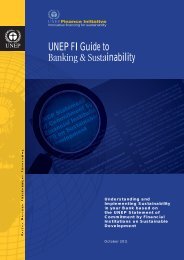UNEP FI Asset Management Working Group The - UNEP Finance ...
UNEP FI Asset Management Working Group The - UNEP Finance ...
UNEP FI Asset Management Working Group The - UNEP Finance ...
Create successful ePaper yourself
Turn your PDF publications into a flip-book with our unique Google optimized e-Paper software.
Non-green asset managers could be sued: U.N. report<br />
Tue Jul 14, 2009 11:08am EDT<br />
LONDON (Reuters) - Investment advisors and asset managers could be sued for negligence if they do not<br />
consider the environment and other social issues when making investment decisions, a United Nations report<br />
said on Tuesday.<br />
Money managers have a legal responsibility to raise environmental, social and governance (ESG) issues when<br />
tendering investment and advising clients, a law expert and one of the report's authors said.<br />
"(<strong>The</strong>re is a) very real risk that (the advisor) will be sued for negligence on the grounds that they failed to<br />
discharge their professional duty of care to the client by failing to raise and take into account ESG<br />
considerations," said Paul Watchman.<br />
<strong>The</strong> report was produced by the <strong>Asset</strong> <strong>Management</strong> <strong>Working</strong> <strong>Group</strong> of the U.N. Environment Programme's<br />
<strong>Finance</strong> Initiative (<strong>UNEP</strong> <strong>FI</strong>), a partnership between the United Nations and more than 180 financial institutions<br />
with over $2 trillion under management.<br />
"Responsible investment, active ownership and the promotion of sustainable business practices should be a<br />
routine part of all investment arrangements, not an optional add on," said Steve Waygood, head of sustainability<br />
research and engagement at Aviva Investors, who also worked on the report.<br />
<strong>The</strong> report said that in the wake of the economic downturn, investment professionals now had a central role in<br />
using global economic stimulus money, estimated by HSBC to be around $2.8 trillion, to fund the transition to a<br />
low-carbon and resource efficient 'green' economy.<br />
"As investors return to the markets, the question remains whether the funds will go to the brown economy of<br />
yesterday -- or to a new green economy," said Achim Steiner, head of <strong>UNEP</strong>.<br />
But only around $430 billion, or 15 percent of these funds have so far been earmarked for funding the green<br />
infrastructure, according to research published by HSBC Global Research in February.<br />
One author said the worst financial and economic crisis in generations paled in comparison to what he called a<br />
looming "natural resources crisis" that would require investment professionals to rethink where they put clients'<br />
money.<br />
Last year, environmental group WWF said investors faced increased risk from companies that invested in<br />
unconventional fossil fuels without considering pending climate regulations or greenhouse gas emission permit<br />
costs in a carbon-constrained economy.<br />
(Reporting by Michael Szabo; Editing by Michael Kahn and Jon Boyle)<br />
© Thomson Reuters 2009. All rights reserved. Users may download and print extracts of content from this website for their own personal and noncommercial<br />
use only. Republication or redistribution of Thomson Reuters content, including by framing or similar means, is expressly prohibited<br />
without the prior written consent of Thomson Reuters. Thomson Reuters and its logo are registered trademarks or trademarks of the Thomson<br />
Reuters group of companies around the world.<br />
Thomson Reuters journalists are subject to an Editorial Handbook which requires fair presentation and disclosure of relevant interests.<br />
7


